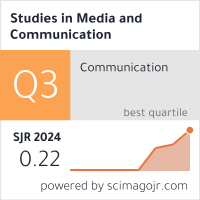Is TikTok a Public Sphere for Democracy in Egypt? The Application of Habermas’s “Pseudo-Public Sphere”
Abstract
Purpose: This study explores TikTok’s potential as a new space for engagement within Egypt’s media landscape. This study addresses three core questions: 1) What motivates users to discuss public issues on TikTok? 2) How do Egyptians use TikTok for online civic participation? 3) Does TikTok support the emergence of a public sphere in Egypt?
Design/methodology/approach: Using qualitative research approach, this study conducted 30 semi-structured interviews with Egyptian TikTok users aged 18 to 35 from diverse socio-economic backgrounds. Thematic coding was applied to analyze their motivations on TikTok’s role in civic engagement.
Practical implications: This research highlights the challenges of using TikTok as a platform for civic engagement in Egypt. Policymakers, media scholars, and digital activists should consider how platform design and algorithmic curation influence political discourse and explore ways to enhance TikTok’s potential for meaningful public debate in Egypt.
Results: The study found that while users engage with public issues mainly out of curiosity or entertainment, their involvement is mostly passive, limited to liking and sharing videos. Very few participants create original content or engage in meaningful discussions. TikTok’s algorithm prioritizes entertainment driven content, which limits its effectiveness as a space for substantive political discourse. Reflecting Habermas’s concept of “pseudo-public sphere,” TikTok operates as “limited public sphere,” fostering surface-level discussions that rarely translate into real world democratic engagement.
Originality/value: This study fills a gap in the literature by offering empirical insights into TikTok’s role in shaping public discourse in Egypt.
Full Text:
PDFDOI: https://doi.org/10.11114/smc.v13i2.7474
Refbacks
- There are currently no refbacks.
Studies in Media and Communication ISSN 2325-8071 (Print) ISSN 2325-808X (Online)
Copyright © Redfame Publishing Inc.
To make sure that you can receive messages from us, please add the 'redfame.com' domain to your e-mail 'safe list'. If you do not receive e-mail in your 'inbox', check your 'bulk mail' or 'junk mail' folders.
If you have any questions, please contact: smc@redfame.com
------------------------------------------------------------------------------------------------------------------------------------------------------

